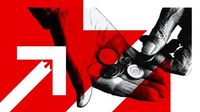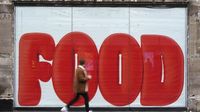UK inflation eased more than expected in February 2025, driven primarily by a significant drop in clothing and shoe prices. The Consumer Prices Index (CPI) inflation rate fell to 2.8%, down from 3% in January, according to the latest figures released by the Office for National Statistics (ONS). This unexpected decline in inflation offers a glimmer of hope for Chancellor Rachel Reeves as she prepares to deliver her Spring Statement later today.
Grant Fitzner, chief economist at the ONS, noted that women’s clothing was a major contributor to this month’s fall in inflation. He stated, "Inflation eased in February. Clothing prices, particularly for women’s clothes, was the biggest driver for this month’s fall." This decrease in clothing prices marked the first decline in over three years, with overall prices for clothing and footwear falling by 0.6% in the year leading up to February.
Despite the positive news, the cost of living remains a concern for households across the UK, as inflation continues to hover above the Bank of England’s target of 2%. Economists have warned that the tide could turn again next month with the onset of new tax year price increases. The ONS reported that prices typically rise between January and February, but this year saw an unusual number of sales extending into February, contributing to the unexpected drop.
As the Spring Statement approaches, Chancellor Reeves is expected to outline spending cuts across various government departments and respond to the latest economic growth projections, which have been downgraded by the Government’s official forecaster. The economic landscape remains precarious, with rising costs for energy, water, and council tax anticipated in April. The energy price cap is forecast to increase by £85 to £1,823, marking its highest level since early last year.
Chief Secretary to the Treasury Darren Jones emphasized the government's commitment to kickstarting economic growth, stating, "Our number one mission is kickstarting growth to raise living standards for working people, that is why we are protecting working people’s payslips from higher taxes." However, concerns remain regarding the potential for stagflation, a situation where inflation rises while economic growth stagnates.
Sarah Coles, head of personal finance at Hargreaves Lansdown, warned of impending price rises, saying, "Awful April risks kick-starting inflation again." She highlighted that, in addition to energy costs, water bills are expected to rise by an average of £123, and council tax is set to increase by an average of £109. Coles added, "The Bank of England is expecting inflation to peak at 3.7% later this year."
Food inflation is also projected to rise, with predictions indicating it could hit 5% by the end of 2025, driven by tax changes announced in the autumn budget. Kris Hamer, director of insight at the British Retail Consortium (BRC), noted that while some dairy products like milk and cheese saw price drops, the overall outlook for food inflation remains grim.
The Bank of England's policymakers have been closely monitoring inflation trends, particularly in the services sector, which remained unchanged at 5% in February. James Smith, a developed market economist for ING, indicated that this level is higher than analysts had anticipated, stating, "This matters because services are the part of the inflation story that the Bank of England cares about most."
As inflation continues to present challenges, the Bank of England has cut interest rates three times since August 2024, reducing them to 4.5% in February. However, the central bank faces a delicate balancing act. Increasing rates could suppress economic growth, while not acting could allow inflation to spiral further.
In the US, inflation also fell to 2.8% in February, mirroring the UK’s situation, while the inflation rate for countries using the euro dropped to 2.3%. This suggests that the challenges of managing inflation are not unique to the UK, as central banks across the globe navigate the complexities of rising prices and economic stagnation.
Chancellor Reeves' upcoming Spring Statement is anticipated to address these economic pressures, with expectations of further cuts to welfare spending and a detailed plan for government spending adjustments. Shadow Chancellor Mel Stride criticized the current administration, stating that the Conservatives left government with inflation on target, urging Reeves to take immediate action to alleviate the financial strain on working families.
As the UK economy grapples with these inflationary pressures, the focus remains on how the government and the Bank of England will respond in the coming months. With inflation still significantly above the target and economic growth teetering on the brink, the stakes are high as policymakers seek to navigate this challenging landscape.







